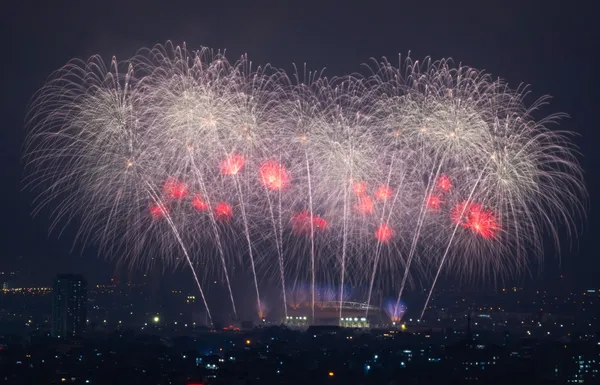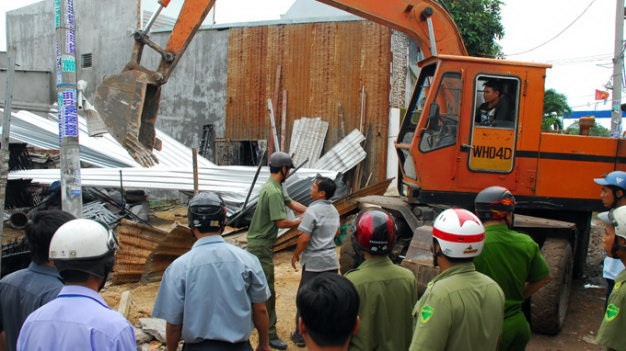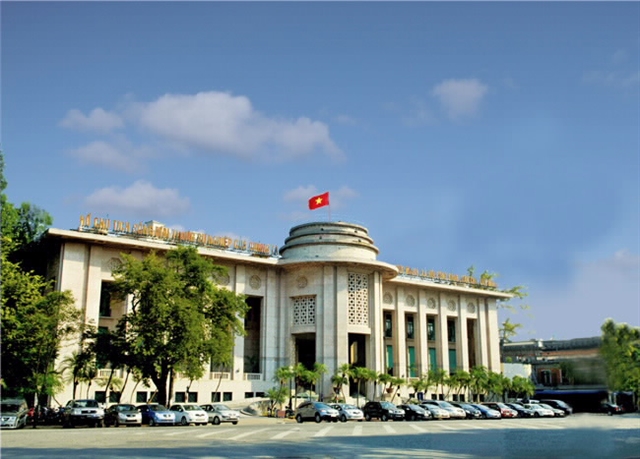 Society
Society

Violations of construction regulations have been increasing in HCM City despite sanctions imposed by the city, according to the city’s Construction Department’s inspection division.
 |
| An unlicensed construction work in HCM City’s District 9 was ordered for removal by city authorities. — VNS File Photo |
HCM CITY — Violations of construction regulations have been increasing in HCM City despite sanctions imposed by the city, according to the city’s Department of Construction’s inspection division.
In the first nine months of the year, the number of unlicensed construction works rose by nearly 36 per cent, while the number of projects with different construction permits increased by 11 per cent compared to the same period last year.
To better manage the situation, the construction department has proposed transferring the construction inspection team management to district authorities.
Inadequate sanctions
Public opinion has recently been focused on the construction violation in Thủ Đức District’s Hiệp Bình Chánh Ward, where construction of 44 boarding rooms was suspended.
The rooms were built without any construction permits. Despite the suspension of these works by the Construction Inspection Division of Bình Thạnh District in November 2015, these boarding rooms were completed and rented.
It was not until August 2017 that these construction works were coercively removed and the late removal of these illegally built works angered residents in the area.
The late removals were caused by a variety of reasons, including inadequate work of the inspection teams and poor co-operation between the inspection forces and authorities of districts and wards in HCM City.
A spokesman for the District 9 People’s Committee said that District 9 had seen many illegal construction works in the past few years because of rapid urbanisation, with a population increase of 17,000 people (which is the average population of a ward in HCM City) per year.
The area, which is located near schools and factories employing large numbers of labourers, has a high demand for accommodations.
Previously, the construction inspection teams at the ward level included an official in charge of land registration and another for construction as well as two to three building inspectors.
The construction inspection teams only reported violations to district authorities. This made the removal of illegally built works more difficult because district authorities considered documents related to the illegal works only after construction had been completed.
Solutions
The District 9 People’s Committee has asked for permission from the city to set up special teams that would include the chairmen of wards’ people’s committees as heads of the teams that review unlicensed construction works in each ward.
Meanwhile, Nhà Bè District authorities have asked the Department of Construction to urge the municipal People’s Committee to amend regulations on cooperative construction management because the rules are confusing and overlapping.
Trần Trọng Tuấn, director of the city’s construction department, said a decision issued by the city government in 2013, for example, required the People’s Committee of each ward to be responsible for inspecting, discovering and treating illegal construction works.
He said the decision also specified that inspectors from the city’s Construction Department were responsible for inspecting and treating works that have different construction permits.
The construction inspection teams work under the construction department, not under district authorities.
Tuấn said this had made management of construction projects in wards difficult, and he asked appropriate agencies to send building inspectors to districts where they could be more effective at the grassroots level. — VNS




